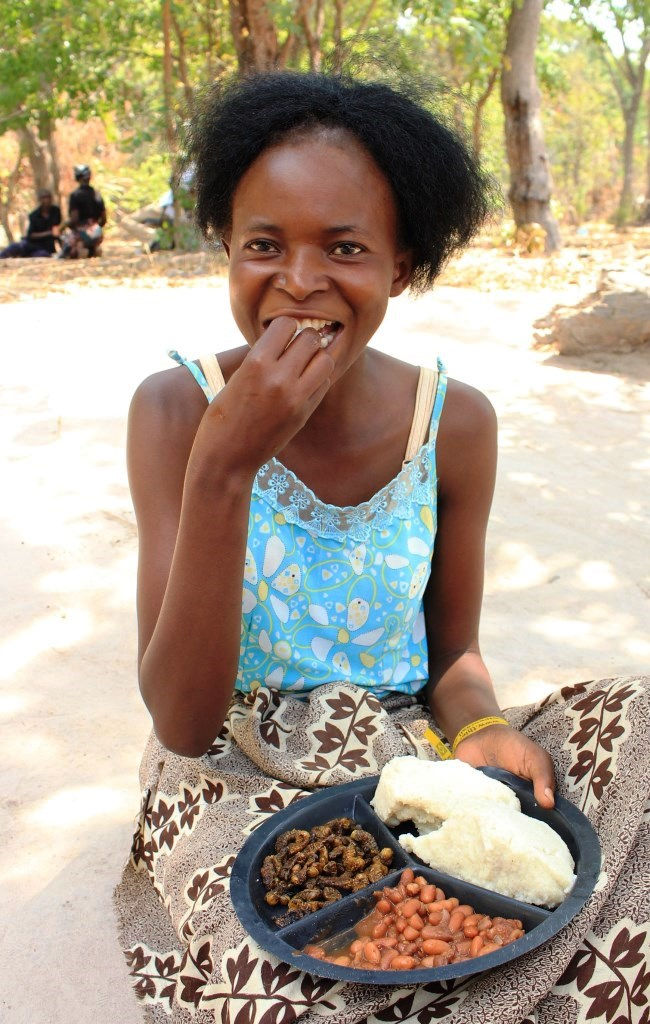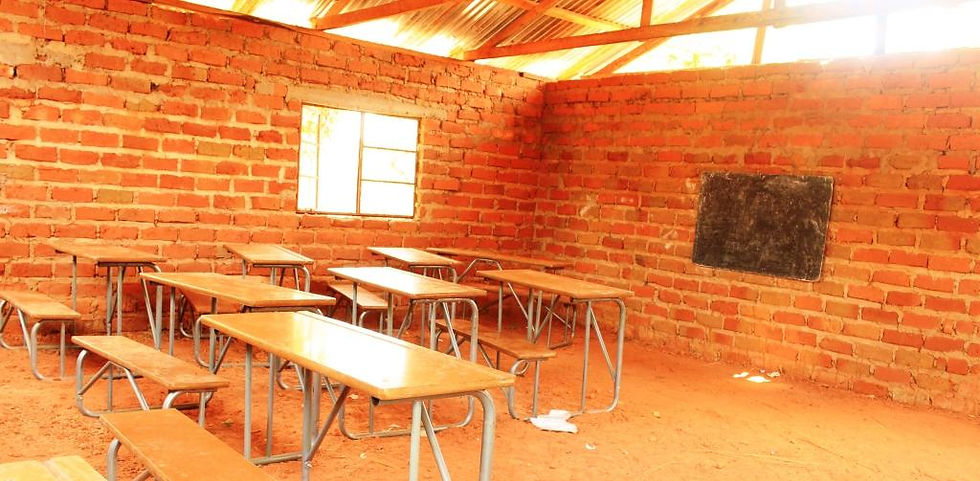Experience #10 - Chintandu, Kasama, Zambia
- 17 de nov. de 2014
- 7 min de leitura

Since the beginning of this journey we had a few dreams, one of them was to live the life of rural African villages and we had this opportunity in Chintandu, near to Kasama, in the extreme north of Zambia. Even imagining many ways of how this could be, what we felt in the three days we were living with the Kasonde family overcame by far our expectations.
Before telling everything I need to thank this unique experience to our great friends Claire Albrecht and Justin Hostetter, who we met through WWOOF (organization which I presented in the last post). They are two young Americans absolutely inspiring and enlightened who changed their lives to reside in Zambia and transform the life of local youths. Through the creation of the Kasama Micro Grants they enable the dreams of girls in the rural community to come true, empowering them with education. – Please handle your curiosity, as Gabi will tell everything in the next post. I just couldn’t not mention them after so much love and the warm care they took of us during this wonderful week we lived together.
Back to the village, the first impressions we had and took with us from there were joy, generosity, good humour and respect. Just that… Values which I have a great affinity for believing that they would change just a bit the world…

Chegando à casa deles, literalmente no meio da floresta sem cerca nem portão, o casal Kasonde veio correndo e sorrindo em nossa direção para um grande abraço apertado de boas vindas. – Foi o nosso primeiro contato, detalhe. – A criançada imediatamente pegou as malas de Getting to their house, literally in the middle of the jungle with no fence or gate, the Kasonde couple ran smiling towards us for a warm and squeezing welcome hug. – It was our first contact, detail. – The children immediately took the bag out of our hands to carry, as a first impact kindness. Evidently I didn’t feel well in letting a child hold more weight than I, but I reminded my concern to watch over the local culture, when acceptable of course. Polygamy, for instance, I was not allowed to accept so far… (It’s a joke Gabi).
While getting in we noticed it looks like a farm, as it’s in an open area with separate huts. They immediately got us chairs and ensure we seat while they were seating on the floor. In minutes Mrs. Kasonde brought us dishes, cups with water and placed food in the centre. Just after, a jar of water, soap and a bucket so we could wash our hands there. It’s custom as the meals are made with hands. They gently asked us to get the food first and didn’t hesitate in telling us to repeat as much as we wanted. A curiosity of the manly culture is that just Gabi, him (Mr. Kasonde) and I seated at the towel over the floor for the meals. The mother and children ate around the pans a few meters away from us and the girls were the ones who collected the dishes from the “table” and washed them all. They are all very polite.

Naturally we ate all they offered us. The nshima is the most traditional, a mixture of water, corn, cassava or sorghum. In Zimbabwe (where it is also typical) we followed its preparation and saw it’s quite a handy job, as in a certain moment you can’t stop mixing anymore for a while. In the routine they usually also eat beans, herbs sauces, tomato and cooked vegetables. When fits in the income they eat chicken, small fishes with spine, like catfish, but ten centimetres long. Occasionally goat, pork and cow. The most unusual for our gastronomy standard is the caterpillar. It’s very small, crunchy, salty and fried. Tasteful, but our cognitive superstition still tried to tell our thinking “don’t do that…”

Ba Kasonde, how they call the male leader of the family, is extremely humorous, made fun of everything and usually gave those slaps to join his smile. I really laughed together, a lot… When the children were saluting us they did a reverence bending the knees and body towards us to show respect. It called out our attention so much gentleness all the time, in a place where our ridiculous prejudice associates “poverty” (meaning less wealth) to a gap of politeness. This association is even more bizarre when we remember that we belong to a social environment a lot ruder, especially in the way people treat each other in the traffic jam, work, restaurant, in life…

He was a military for twenty years until he retired and moved to this village in 1989. They had nine children, today seven are alive and three are living with them. He doesn’t know how many grandchildren in total. The popular myth that says that the Africans have many children so they can maintain their parents in the future got a bit questionable, as in his case the four children who live and work in the closest town don’t help in anything…
Besides the two huts where they sleep, there is a main hut where they cook and eat, animals’ ponds and bathrooms. For who grew with privileges in a big city (like me), the biggest difference is in this last one. The walls are made of long dry grasses, the shower is taken with bucket and mug and the toilet is a hole in the ground with bricks to support. All the water used comes from a well they built where it’s collected by hand with a hope and a gallon.

At his seventy seven years old he maintains the family with his monthly retirement pension of thirty dollars and his garden. He cultivates cassava, tomato, sugar cane, corn and vegetables. He also grows chickens, goats and pigs to sell and sporadically feed the family. Also adding to the ritual of generosities, they offered us to slaughter a chicken to celebrate our visit, but we just thank them and ask for them to keep her alive. They intensively thanked our negative response. It was a thoughtful moment, maybe because we spared something substantial for them. Curious…

A part from admiring this simplicity in the way of living, we went there to learn even more agriculture techniques. He works alone in his garden since he moved there and made it all with his own hands. As he doesn’t have much resource, the irrigation is made with bucket and water from minor wells he made. It’s an exhausting labour and he was happy that the rainy season is about to start at any time in November and should last until May. I could imagine the relief after making a few trips of ten litters of water to help. My back felt it…
Living together those days we asked him to follow his routine normally, so we wouldn’t mess up and could get to know the most. Starting at 5.30h we took care of the crops for a few hours and then got back to lunch. In the afternoon he fed the animals and rested with the family. After that he enjoyed listening to the radio, when he was able to find the signal. In the collection of generosities, they also prepared affectionately the local beer made of millet so we could try it. It has a beige colour and the cereal flakes, a bitter flavour and doesn’t make foam. It’s not bad, but not so good – I was quite polite in the evaluation, come on… –

In one of the days he walked us around the village, where we passed through many houses always saluting with the little we learned from bemba, the local language. We went to the village head’s house, he is sort of a judge to solve any internal disagreement and also an external representative of the district. The sad part was when we met the community school, which was left there due to the lack of resources and volunteer teachers interested. To see a classroom with a floor full of sand, dusty tables and another with just bush shocked us even more, especially because the biggest portion of the children we met go, in theory, to this school. At that moment it turned clear that many of the positive answers we got when asking if a child studied, were not necessarily real. Or due to the shame of answering that she was not studying or just for being the easiest way to answer… According to how deep we were able to go in the subject with our cautious tone, we noticed that a movement to collect one dollar per month from each of the two hundred families, who live there, to pay a teacher from the village would be quite feasible. But sadly we felt the lack of initiative. Gabi tried to be hard enough to share this idea, but in reality it’s only in their hands. We will always hope for that!

The most incredible out of those “rural days” was to ensure we were together with them all the time, except for sleeping… Particularly to sleep we had another great generosity, as their oldest daughter, Estella, kindly conceded us her hut so we could feel more comfortable. I can reveal we slept with unexpected friends, like giant grasshoppers and abused rats eating our food… Even awaking up just a few times (thirty per night), we rested well.
In this local familiar pace, I confess I felt a big impact for my constantly accelerated mind wanting to do things. It was hours seating on the ground watching trees, following their conversation without understanding a thing, walking among the pigs, rescuing fugitive goats and frightening the chickens. Even those moments of absolute silence happened and a sensation of being present there just floating in time was unexplainably pleasurable.

In the thinking moments it gets every time clearer that my conscious interior I has absolute conviction that I have pleasure for being there in harmony, with good generous people, with nature and appreciating life. But my thinking-ego still wants to resist sometimes and to try to convince me that there is not good… It’s difficult to establish this conversation between the consciousness and the ego, after three decades being daily affected by desires which were many times necessarily unnecessary… Well, I’m getting to know myself more, that’s good! But calm down folks from the inside (of my mind), relax as we are in Africa .
This is the constant conflict of our society, impose a rhythm that a group with power wants and dictate what each one of us have to think about what is better. Well, I wish you the strength needed to know and nourish your “I”!
The video shows a little of how were those amazing days.
Gratitude to Claire, Justin and Kasonde family!
Have fun!
Felipe.




Comentários